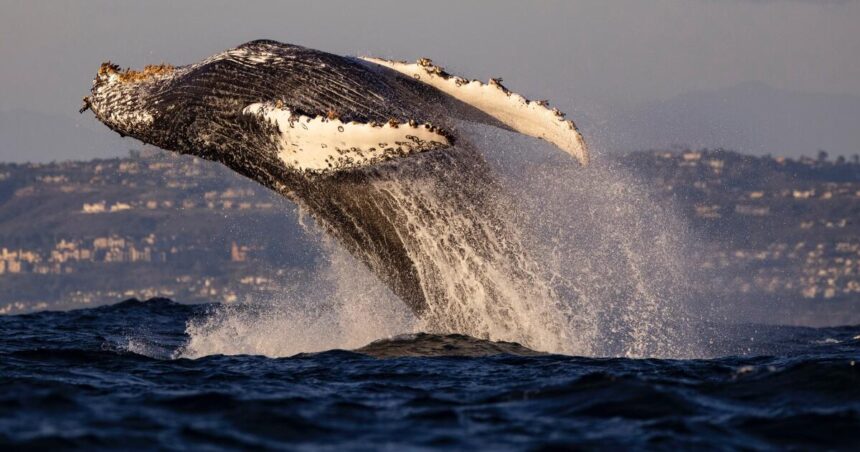Shortly after noon Sunday, the waters eight miles off the coast of Newport Beach were broken by an unusual, if not majestic, sight.
A several-ton humpback whale broke through the surface and leaped into the sky, like a Pacific Life insurance commercial, scattering adjacent seabirds while opening its massive mouth to consume anchovies near the surface.
captured the moment via a drone, something that has become more common in the last few weeks.
For the last two months, Orange County waters have become Southern California’s own humpback hangout.
“I’ve been working in this area for 10 years and I’ve never seen this crazy level of humpback whales,” Girardeau said. “But they’re here and it’s incredible.”
Girardeau also works as a deckhand for , which offers ocean tours and sightseeing excursions.
In a normal year, Girardeau would be pointing out dolphins, along with fin and minke whales, to tourists in search of sea life.
The humpbacks started popping up recently, following massive schools of anchovies, a typical food source.
While it’s normal to see humpbacks in Monterey Bay or Hawai’i, Southern California is more of a transitory point for the whales en route to Mexico or even Costa Rica, according to Girardeau.
“You know how we travel to Cabo and Puerto Vallarta for vacation,” Girardeau said. “Well, they do the same except as part of their breeding patterns.”
Newport Coastal runs a sighting log that has tracked the first appearance of humpback whales, starting Sept. 25. Since then, humpbacks have been spotted in droves, including 18 on Oct. 19, more than 16 on Oct. 26 and 17 on Nov. 1.
A dozen were spotted between 10 a.m. and 1:45 p.m. on Wednesday.
The hundreds — or, in some cases, thousands — of dolphins that share space with the whales push the anchovies from shallow waters to the surface as they also consume the creatures, according to Girardeau.
That spurs the humpbacks to lunge into the air to collect the small fish, creating the iconic imagery.
Girardeau said he wasn’t quite sure what’s led to the increase of area anchovies, but that global warming or changes in currents may play a factor.
“It’s been almost all day for the last few weeks watching these amazing creatures,” Girardeau said.
Normal whale-watching season is expected to resume with the return of the gray whales, which will be traveling between Alaska and Mexico from January through May.










